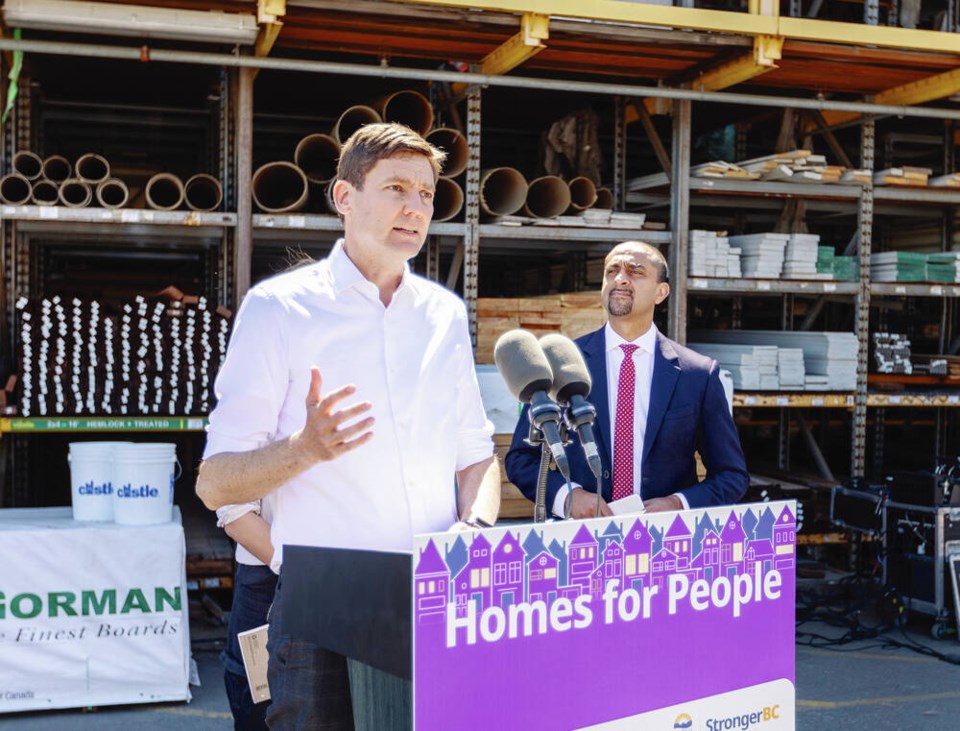The province opened applications on Thursday for a $40-million low-interest loan program to help homeowners build secondary suites, as part of its efforts to generate more affordable housing in B.C.
Premier David Eby and Housing Minister Ravi Kahlon launched the three-year incentive program at Castle Building Centre on Bay Street in Vic West.
Homeowners will be offered forgivable loans for as much as 50 per cent of the total cost of renovations, up to a maximum of $40,000, to help cover construction costs for new basement suites, garden suites, or carriage or laneway homes on their properties.
“Which means that 1,000 individuals and families a year will benefit from being able to access below-market rental housing that we know is desperately needed in our communities,” said Eby.
Eby said there’s no “one silver bullet for the housing crisis,” which requires a wide array of responses from governments and communities.
Applications opened Thursday at 12:30 p.m. on a first-come, first-served basis to the first 1,000 homeowners of 3,000 homeowners who are eventually expected to take advantage of the program.
Kahlon indicated that depending on the uptake, the next opening may be later this year. “This is a pilot. It’s an innovative new tool,” he said. “We’re going to see how it rolls out and if it needs to be expanded then I’ll be knocking on the Minister of Finance’s door.”
To be eligible, homeowners must be Canadian residents with a household income that does not exceed $209,420 based their tax return. The home itself cannot be assessed for more than $2.150 million in 2024.
Most incorporated municipalities and regional districts are included.
The new suite to be constructed must be a self-contained unit with its own kitchen, bathroom and sleeping area within the dwelling or on the property and cost a minimum of $20,000 to build. The loan is not available for renovations to existing suites.
The loan will be provided after work is finished and an occupancy permit has been issued. If the homeowner rents out the secondary suite at or below market rates — set by B.C. Housing — for at least five years, the loan will be forgiven — at 20 per cent each year over five years.
In Victoria, the rent must not exceed $1,400 for a one-bedroom, $1,760 for a two-bedroom or $2,035 for a three-bedroom for the loan to be forgiven.
In Nanaimo, the threshold is $1,325 for a one-bedroom, $1,821 for a two-bedroom, and $1,821 for a three-bedroom, and in Duncan, it’s $931, $1,086 and $1,650.
University of Victoria student Nathanial Hope Tucker said when he started his undergraduate degree in science and economics, he moved out of his parents’ home, but soon returned due to rising rents. “I’m quite fortunate that I had that opportunity,” said Hope Tucker. “Many of my friends and peers don’t have that same luxury.”
Now, as he looks at heading next year to UBC to complete a masters degree, he says even though he’ll be sharing a unit with other students, his rental costs will make up more than half his available funds.
“Obviously this is an unsustainable way to start off your career in education,” said Hope Tucker, who said secondary suites and laneway houses are ideal for students. “If I was able to find one at $1,400 I’d be rather thrilled.”
To be eligible, homeowners have to have acquired building permits for the new suites on or after April 1, 2023. Costs that can be covered include architectural and design fees, building and trade permit fees, materials and contractor labour, electrical work and fixtures and appliances.
BC United leader Kevin Falcon criticized the program, saying taxpayer money will essentially go to “privileged” owners already living in “multi-million dollar homes” and that grant money will give them income benefits for years to come.
Falcon said he would create a provincial standard for secondary suites that doesn’t involve municipalities, “so that people can go and get these things built and built quickly without without having to go through each municipality’s regulatory morass,” which he said is one of the main reasons it’s difficult to get secondary suites built.
Loans should be repayable on favourable terms, “to ensure we get the housing built up and get it built quickly,” he said.
Dusty Delain, owner of Amity Construction, said to build a self-contained suite in a 1950s or 1970s home would cost well over $100,000, which makes the province’s $40,000 forgivable loan “a little bit of a subsidy.”
Even if renovation costs could be kept to $100,000 — $200,000 is more realistic — that’s about $1,200 a month to repay the loan and an owner could only charge $1,400 for a one-bedroom in Victoria, he said.
Delain said those with older homes also have to consider the multiple building and safety codes that would have to be met — fire, electrical and plumbing codes, along with rules governing noise, asbestos and lead paint — all of which drive up costs.
“Even after the five years when the government says well, you are forgiven that $40,000, the homeowner’s out of pocket,” said Delain, adding the landlord may then have tenants for whom they can’t raise the rent.
For information about the Secondary Suite Incentive Program visit: https://bchousing.org/secondary-suite
To read the Home Suite Home guide, visit: https://gov.bc.ca/HomeSuiteHome



